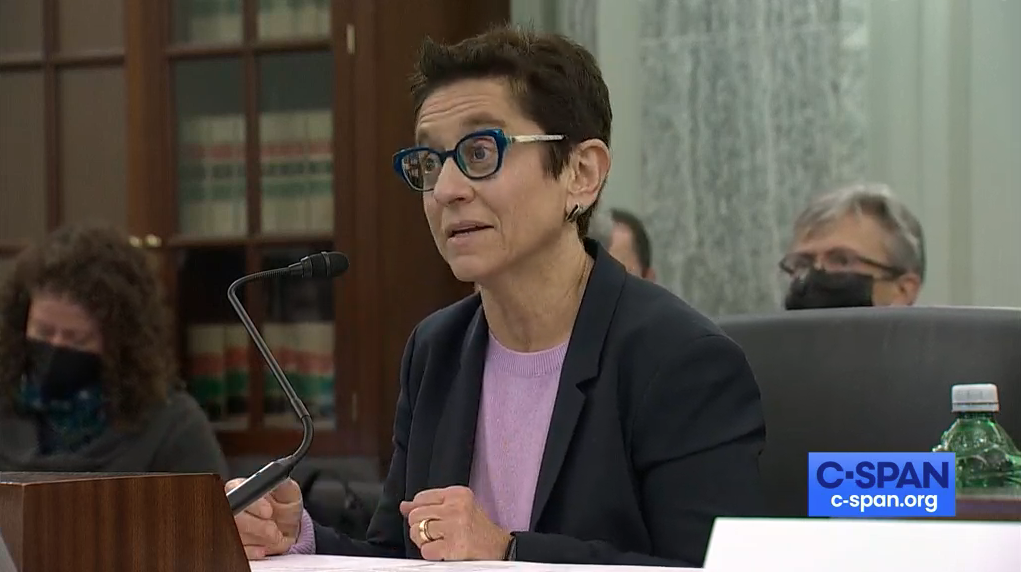ISPs Have Problem with Gigi Sohn‘s FCC Recusals
Senate Commerce Committee asked to ponder ramifications before vote this week

The smarter way to stay on top of the multichannel video marketplace. Sign up below.
You are now subscribed
Your newsletter sign-up was successful
Cable and telecom internet service providers are pushing back on Democratic Federal Communications Commission nominee Gigi Sohn‘s promise to recuse herself from some issues if confirmed. They‘re suggesting such an offer signals a wider problem with which issues she would or should be weighing in on, and what impact that would have on the agency and the industry.
NCTA – The Internet & Television Association and USTelecom, in separate but similar letters to the chair and ranking members of the Senate Commerce Committee, told them they had issues with Sohn‘s promised recusal from certain broadcast matters. The Commerce Committee is holding a confirmation hearing vote Wednesday (February 2) on Sohn‘s nomination. The trade groups signaled there are some cable/broadband-related issues — think net neutrality — for which her past advocacy should raise similar concerns, if there are any concerns to be raised.
Sohn has pledged not to participate in agency decisions regarding retransmission consent or copyright issues if she is confirmed to the open Democratic seat on the commission.
That stems from her advocacy on those issues when she headed Public Knowledge.
Also: Preston Padden: ‘Wall Street Journal’ Declines Letter in Defense of Gigi Sohn
In her recusal offer to FCC general counsel Michelle Ellison, Sohn promised that, for the first four years of her term as commissioner, “I will recuse myself from participation in FCC Docket No. 10-71 or any related FCC docket concerning the same issues.” But she went beyond that.
“For the first three years of my term,” she also wrote, “I will recuse myself from any proceeding before the Commission where retransmission consent or television broadcast copyright is a material issue in the Commission’s disposition of that proceeding.” She defined material issue as “one that has influence and effect on the ultimate disposition of the matter or matters considered in the proceeding.”
Sohn said she would look to the general counsel‘s office to “make any necessary determination on the application of this recusal to a particular matter.”

In his letter, NCTA president and CEO Michael Powell said that while NCTA ”strongly supports” following government ethics rules that are meant to prevent a conflict of interest or the appearance of conflict, “Ms. Sohn’s letter raises several serious concerns.”
While he said the letter should not be read as opposition to the nomination, Powell has a couple of issues with the recusal pledge.
He said it is not clear why those would be the only issues from which she would recuse herself, “given the breadth of issues in which Public Knowledge was involved” under Sohn. He said the recusal should ”logically extend“ to all the matters she advocated for at Public Knowledge, or none.
Second, he said: “Next, in the more recent years since her service at the Commission during the Obama administration, Ms. Sohn has been publicly involved on matters of direct interest to our membership. There is no logical basis for treating these matters differently from the retransmission and copyright issues for purposes of recusal.”
Arguably the main issue she was involved in after Public Knowledge was the Title II-based net neutrality rules she stumped for as a top counselor to then-FCC chairman Tom Wheeler.
More than one Washington insider has suggested that her support for Title II, and broadband operators‘ ongoing unhappiness with that advocacy, was a big reason she was getting so much pushback on the nomination from Republicans.
Also: CWA’s Christopher Shelton Calls for Gigi Sohn’s FCC Confirmation
Powell also has issues with the scope of the recusal, which could cover a wide range of proceedings, past and future, he said. Sohn signaled in her recusal letter she would not be recusing from media ownership rules. But Powell said that “the Commission will repeatedly be required to determine whether retransmission consent or copyright issues are ‘material’ to a particular docket — including media ownership proceedings where the impact on retransmission consent rates can be at issue.” Powell is a former chairman of the FCC.
In its letter, USTelecom also said it was not taking a position on the nomination, only on the recusal offer.
“It appears highly irregular to recuse an official from any proceeding that addresses two broad, important issues because of a prior filing in a rulemaking more than a decade ago,” said USTelecom president Jonathan Spalter in his letter. “In fact, the ethics rules generally state that prior participation in a rulemaking proceeding is not a basis for recusal. Thus, it appears that Ms. Sohn’s reasoning for recusing herself would establish a new standard for FCC commissioners participating in proceedings in which they were previously active.”
USTelecom said the recusal was clearly to assuage the broadcast industry, there are other issues much broader than a single industry. “Can the FCC be confident that Ms. Sohn will not be perceived as being able to act impartially and not give preferential treatment to any private organization or individual based on her prior FCC advocacy if, as it appears from her letter, she is concerned may not be the case for certain issues?”
USTelecom asks whether Sohn‘s failure to recuse herself from other issues on which she has advocated [like Powell“s letter, Spalter does not say which, though net neutrality is the elephant in the room], will that create the appearance of benefitting one industry over others with no precedent or rational basis."
Both NCTA and USTelecom said they want Congress to at least take these into account before they vote “in order,” as Spalter put it, “for you to assess their practical implications for the adjudicatory and rulemaking functions of the FCC as well as on the continued effectiveness and impartiality of the Commission.”
“Rather than ensuring impartiality,“ Powell said, ”Ms. Sohn‘s targeted recusal has instead raised serious questions regarding transparency together with significant concerns that one industry has been singled out for special treatment to win their support for her confirmation.“ ■
The smarter way to stay on top of the multichannel video marketplace. Sign up below.
Contributing editor John Eggerton has been an editor and/or writer on media regulation, legislation and policy for over four decades, including covering the FCC, FTC, Congress, the major media trade associations, and the federal courts. In addition to Multichannel News and Broadcasting + Cable, his work has appeared in Radio World, TV Technology, TV Fax, This Week in Consumer Electronics, Variety and the Encyclopedia Britannica.

